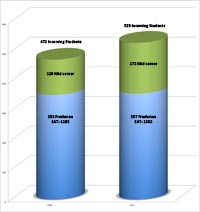Honors Continues to Grow, Attracts Mid-Career Students

The Honors College entering class of 2011 was not only large (529 students), and not
only exceptionally talented (with an average SAT score of 1302 and with 60% in the
top 10% of their high school class), but it also included the largest cohort of mid-career
students ever to enroll in the College.
Dean Bill Monroe and the recruitment team recently recognized that Honors was not significantly recruiting or matriculating mid-career students, and that these students did not have a clear curriculum path if they did join the College. To bring these talented students into Honors, the College created a separate application for mid-career students, defined as those who did not enter Honors immediately following high school or who completed college hours outside of Honors. “This separate mid-career application focuses on college credits,” said admissions counselor Sarah Bhojani. “It allows the admissions committee to accurately evaluate the experience of mid-career students and predict their success in Honors.” Additionally, the recruitment staff continues to visit community colleges and has increased its outreach to exceptional students at the University of Houston. This outreach takes the form of invitation letters to those with GPAs over 3.75, as well as recruitment and orientation events in January and October to help these students streamline their application and advising process.
Additional changes that make Honors more welcoming to these mid-career students are the new curriculum options that allow students to graduate with Honors by completing an Honors minor or a reduced coursework option—one that still includes a semester of the cornerstone Human Situation course—and a new graduation designation for those who complete these options, Collegiate Honors. While many mid-career students, including most of those in the Bauer Honors and Honors Engineering programs, complete the full Honors curriculum, Collegiate Honors offers a choice for those who join Honors with their core courses already complete.
Now that mid-career students are a focus for Honors, the College reaps the benefits of these students in the classroom and the community. Three mid-career students were recognized, for example, among the Outstanding First Year Students at the 2011 Fall Convocation: Adam Brewer, Keri Myrick, and Mason Biamonte. Brewer was also acknowledged for an Outstanding Human Situation Essay for his paper “Frankenstein: Of Monster and Man.”
Read about the contributions and experiences of two mid-career Honors students - Nic Leschke and Kat Berry.
Nicholas Leschke
Nicholas Leschke entered the Honors College in fall 2011 after 16 years as a professional ballet dancer. Because he always intended to continue his formal education after he retired from dancing, Nic took classes on and off during the majority of his career, and enters the College—and his engineering major—with 84 credit hours.
While he won’t take his first semester of Human Sit until spring, Nic has jumped into Honors life this first semester, taking three Honors classes in engineering, attending Honors Retreat and the Halloween party, and participating in a recent Habitat for Humanity build with his Honors Engineering Program colleagues. Nic appreciates the “smaller family inside the University” as well as the “sense of community and smaller class sizes” that the Honors College has offered him so far, and hopes—after experiencing classes like engineering math with Dr. Matthew Nicol, statics with Dr. Mo Li, and intro to engineering with Dr. Diana de la Rosa-Pohl—for more Honors engineering classes to take as the Honors Engineering Program grows.
Katherine Berry
Katherine Berry admits that she “picked the Honors College hoping they’d pick me back” when she came to the University of Houston to continue her study of accounting after a few semesters at Wharton County Junior College. Like many students who choose Honors, Kat was looking to challenge herself, so in addition to appreciating Honors for the smaller classes and the help of the dedicated faculty and staff, she was excited to learn about the Human Situation course. She said, “I wanted to be a better reader, writer. I wanted to be better at critical thinking and to be a better person when I’m done,” and knew that Human Sit would help her reach those goals.
Kat has been a work-from-home mom for the past 20 years and knew she wanted to have as much of the college experience as possible. So when she joined Honors, she attended Honors Retreat and highly recommends it—especially for mid-career and non-traditional students. She said, “I found that none of the freshmen treated me differently and that everyone was welcoming. Getting that feeling even before starting classes made everything easier.” Part of that sense of ease came from being in a retreat group, and a mentor group, specifically populated with mid-career students and counselors. “The transfer students have a slightly different mindset, they’ve already had some stumbles, and the transfer mentors understand that.”
Kat’s favorite thing about the College is definitely the people, she said. From a Human Sit study group where everyone shared notes and “wanted to help each other rather than being cut-throat” to the SGB committees for the Halloween party and other socials, she feels welcome at the College, and excited to let other people know about her experiences in Honors.
